

Columbia University has expelled or suspended nearly 80 students for participating in pro-Palestinian protests, marking the largest disciplinary action for a single political demonstration in the university’s history. Sanctions include multi-year suspensions, degree revocations, and expulsions, primarily targeting those involved in the May 7 occupation of Butler Library during finals and a 2024 alumni weekend encampment. Student coalition Columbia University Apartheid Divest (CUAD) condemned the move as retaliation for demanding the university divest from Israel-linked companies amid Gaza’s humanitarian crisis.
The disciplinary wave follows the Trump administration’s March decision to freeze $400 million in federal research grants, citing Columbia’s alleged failure to address antisemitism during protests. Internal documents reveal the university accelerated punishments while negotiating to restore funding, agreeing to ban face coverings at protests, empower campus police to arrest students, and adopt a controversial antisemitism definition equating anti-Zionism with hatred. White House spokesperson Harrison Fields applauded Columbia’s actions as "a step in the right direction".
Columbia implemented sweeping reforms demanded by the Trump administration, including transferring oversight of Middle Eastern studies from faculty to administrators, adopting a policy holding student groups liable for members’ actions and cutting ties with CUAD and warning other activist groups. Critics call these changes "the most significant federal intervention into campus speech in modern history," arguing they conflate criticism of Israel with antisemitism and suppress dissent.
Despite suspensions requiring written apologies for re-enrollment, students remain defiant. "Suspension for protesting genocide is the highest honour," CUAD declared, noting Columbia’s sanctions exceed penalties for non-Palestinian protests. The New York chapter of the Council on American-Islamic Relations (CAIR) condemned the punishments as "grotesquely oppressive," accusing the university of "selling its morality" to appease political pressure.